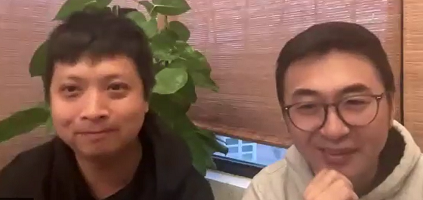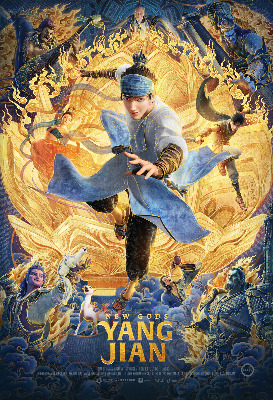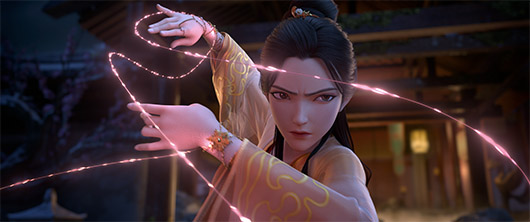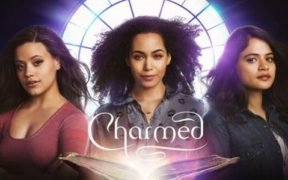TV Interview!

Interview with director Zhao Ji and producer Yu Zhou of the movie “New Gods: Yang Jian” by Suzanne 1/11/23
This is a really cool animated Chinese film that comes out January 20th. I don’t normally watch anime, but I really enjoyed it. It has beautiful animation and tells a great story with a lot of action. The story is based on Chinese folk lore. This movie was a big hit in China, so now it’s premiering here in the U.S. with an English-speaking cast. Everyone associated with the movie is Asian, including the American actors dubbing it. We had a really interesting interview. I’m sorry for any mistakes in the transcript below. Between the accents, the Chinese words used, and the fact that one of them was ill, it was a bit difficult.
Here is the audio interview, which we made into a slideshow video. Below is the transcript.
Yu: I’m the co-founder and president of Light Chaser Animation. Very nice to meet you.
Ji: I’m Ji Zhao, director of New Gods: Yang Jian.
Yu: Yeah, also, as you know, Ji is also the director of Whitesnake, New Gods, and Nezha Reborn. Very productive. Okay, back to you guys. Any question? Feel free to ask.
Suzanne: So, my first question is for Ji. How is directing an animated movie like this different from a live action feature?
Ji: Well, I do work both in animation production and live action production, but I haven’t got a chance to direct a live action movie yet. So, for my experience, I think animation is more creative, because you can create [things that don’t] really happen in the real world. In my live action career, I was an editor, a film editor. From an editor perspective, most of the time, you have to choose the footage from what you already have, but from an animation perspective, you can create [it] when you don’t have that footage. “Oh, I need something,” then we can [just] make it. So, from that I think it’s more creative and more fun. That’s why I changed my career from live action to animation.
Caroline: Ji, I’ve seen your films and I think you seem to be a big fan of Mad Max. I want to ask you, what are your cinematic inspirations, whether Chinese or in the West?
Ji: Actually the animation filmmakers in China, I think, is quite young compared to the Hollywood or other countries’ animators…Sorry about my English. I haven’t used it –-
Yu: Since the premiere of Whitesnake.
Ji: Yeah, three or four years since I’ve spoken English. Okay. I think we grew up with a lot of Western movies, and we’ve seen all kinds [from] Hollywood or like anime from Japan. We won’t say that. That’s part of our experience. So I never saw – like for film it’s an international language. There’s no quite age that you have to do something from the Eastern point of view or Western point of view. Most of them comes from your heart, comes from your own experience. I think – you mentioned Mad Max, but I think Mad Max, you only see that from the punk. I mean, the punk style, but punk does not belongs to any culture. Chinese can have [their] own punk because punk is a spirit not only a racial style. Just because you haven’t seen a lot of Chinese punk movies doesn’t means Chinese culture cannot be punk. Especially when we do the hero like the New Gods, [unintelligible]. That hero himself is a very punk hero in his heart. So, I think it’s fun to combine what we learn from the Western culture and mix with our own culture and create what from our generations point of view, to create a movie like what we saw is the new generation of Chinese heroes.
Matthew Swigonski: The art style is pretty incredible. Did you have a certain inspiration of what you drew for the entire world? You mentioned punk, it seems kind of like it was based off of steampunk a bit.
Ji: I would call that silk punk instead of steampunk. Steampunk is part of the –
(Crosstalk)
Yu: industrialization.
Ji: Right, the 18th to 19th centuries, from the British culture. That’s [where] steampunk original artwork comes from, but for our film, I think we’re trying to create in Chinese Asian, because it’s a Chinese gods’ world. When you think about gods, they’re always more advanced than the technology, culture, everything. They have to be more advanced than people, than human people. So, when I’m trying to create the spirit world, I think they could be more modern. They could mix modern elements, combine something we’re familiar with, or modern life with what we saw, but we’re very familiar with Chinese original culture. So that’s more like we combine modern China or modern technology with traditional Chinese culture when we imagine the spirit world.
Ephney Tsai: You’ve mentioned that you hope these films can showcase the essence of traditional Chinese culture through a modern perspective. Why do you think that this is an important objective to have?
Ji: When I was a kid, I watched like old TV shows of Chinese [unintelligible] mythology. Yeah, the Chinese mythology story from the TV shows. They always imagined people flying from one place to another, stand[ing] on a cloth. And just like the Superman, they just fly from here to there. Because I think during that time, airplanes in China are very few; people won’t see a lot of that. For Asian China, for Asian people, they can now imagine that there is an aircraft flying from one place to another. But every generation, the creator, the filmmaker, the artists should make things from their experience. I think for our generation, we grew up seeing that technology grows very fast. So, that’s actually just part of our life. So I think why the spirit cannot fly with a ship with the aircraft. I remember one time I was on an airplane…taking off. I was seated next to the window, and when the the plane [crossed] the clouds, I saw the beautiful cloud ocean. At that time, I thought maybe in ancient time, the gods, the spirits, they probably just see that. They want to [be] sailing among the cloud ocean. But I think that’s part of, more than life, part of the technology that makes me think that way. For the Asian artists, they’d never really be up in the sky. So, they cannot imagine that way.
Yu: Hopefully I can add a few comments…I want to create some Chinese, Asian or Chinese culture combined with modern technology. Because I think it’s, as he said, flying through the clouds in the sky as a god is something we are as the Chinese people quite familiar [with] from our childhood. Our film, actually the main focus is for the first audience [who] are Chinese. So we’re trying to present what they’re familiar with, what they like. And also, we’re trying to give them some surprise. If you can only give them what they know, [it’s] kind of boring. So that’s the principle, the bottom line of our creativity, where we get our creativity, and also for ourselves, we also liked that kind of style. They call it, after the Muller report [used] that new word called Oriental punk. Other people that create it are calling it that word. Yeah.
Suzanne: I guess I’m next again. By the way, I loved when the little dragon went through the sky. I briefly lived in Chinatown in Honolulu, and I used to love whenever they had the big parades with the dragons. So, that was pretty cool, to see that. There’s certainly a lot to see in this movie; visually it’s fantastic. So, I have a two part question. Who came up with the names of the movies? And was there any concern that people might confuse it with the old DC Comic by Jack Kirby, New Gods?
Ji: Oh, okay. So, when we create this series, it’s a series movie, we were trying to make something different. In China, the Chinese name of the movie is Xin shen bang. Xin means new. So it’s new, but the original version of the story, the function that’s the original version of the story. So, we’re trying to tell our audience in China this is a totally new version. We use the same characters, same heroes, but it’s a different different point of view or a different timeline of the story. So we call this new Xin shen bang. When we translate to English, “Xin shen bang” is a rank. It’s a list. It’s a rank of the heroes in the Chinese Asian history, who is the number one, number two, number three. So, when we translate that, we’re trying to make it simple. We call it New Gods, and –
Yu: Actually we didn’t notice…
Ji: Yeah we didn’t notice that DC has a similar name.
Yu: Thank you for pointing that out. That will probably create some discussion, dispute. It might be a good thing to to know.
Suzanne: I think they were gonna do a New Gods movie, and they decided not to, so I guess you lucked out there.
Ji: I didn’t know that.
Yu: But the function of the story in China is like a proud mother and on top of her years. Everybody knows the story and is familiar with it. And what we did is we based it on that legend. We put on the same serial but in a new era, like modern China. Because they’re gods, they will not die. They will live through all ages. So, even around us, that’s the way we are telling our stories. So, since this [won’t] be the last series – actually we are probably very soon – not very soon. In at least three years, we’ll create another sequel. Yeah.
Suzanne: Great. Thank you.
Caroline: So to Ji, I wanted to ask, so from Whitesnake to New Gods., how would you say your animation direction has evolved over the years?
Ji: I think for me, it’s a quite fast learning experience. Whitesnake I remember it released on
Yu: Actually yesterday it was a four year anniversary.
Ji: Yeah, right. Right. Right. Right.
Yu: January 11.
Ji: Yeah, So, during these four years I released three animation movies. That’s probably a very –
Yu: A record. Three years. Three films.
Ji: Yeah, so, for me it’s a very fast learning experience during those four years. During Whitesnake, I think I was trying to adapt, trying to learn how to be a director, so at that time there will be like some director points of view or directors style, it’s more like all of the team. We were trying to learn the new way of how to make animation so fast. And for the next two movies – because Whitesnake, I co-directed with another director, so the next two movies for me, every time I tried to take a step to try something new I never tried before, that’s always when I create a new movie. For New Gods, obviously that’s a different style, combining modern and Asian story and I never – lucky for us in China we don’t have that censorship rating for animation. I know in Hollywood you guys have like PG, G, whatever the rating, but in China we don’t have that. So, I think animation can tell any kind of story. Even if we wanted we could do a horror story. So, I think it’s cool, because animation, more like media, not only [unintelligible] because when you think animation is [unintelligible] is more like a family film or kids film but then you think we could try to make something more for like a young audience and especially when like in Light Chaser all of our members probably under 30 years old…So, I think it’s cool is for old energy. So, most of our members, most of our colleagues, they don’t even have a kid. How we can make a movie for kids is pretty hard. We don’t even understand how kids react or why kids laugh, so I think is cool like for New Gods and Nezha we find something very –
(Crosstalk)
Yu: More adventures. we take more of a risk. Big risk
Ji: Try something like very new and totally new style more than to tell Asian story, and for Yang Jian, for me, the latest one, I think is combines Asian style, Chinese –
(Crosstalk)
Ji: …ink style kind of Chinese paintings style combined with some CGI technology combined with some punk style. So, for me, like racial wise is a totally different race. Totally different adventure. At the same time, I think, I’m always trying to make the story. This story’s never been told in the original story, I mean, the original Asian fairy tales.
Yu: Exactly. So, the audience can always expect something new from Light Chaser. Not a retelling, not to repeat it. Something new has been made.
Ji: So, I think for me, after these three movies, I’m quite confident with what I already know, but I also found I have a lot of things I don’t know. I think it’s very lucky I’ve gotten a change to [unintelligible]. I grew up at the same time when I [was making the] movie.
Yu: Yeah, you also become a philosopher. The more you know you know, the more you don’t know. That’s very good
Ji: Yeah, so I’m pretty confident with the next movie, Light Chaser Animation and myself, we all will be better.
Yu: [unintelligible] it’s a little bit diplomatic but we always believe that will be the next one.
Matthew Swigonski: What’s one thing you wish viewers would take away after watching this film? Is there one thing you wish that they would think about or learn something they didn’t realize?
Ji: Yeah, I think – it’s a good question; it’s good question. I think it’s different, because most of [the audience] I think is the Chinese audience and what they will think. I never [think about] what the audience from the world, what they will think, because the difference is the Chinese audience is familiar with the original story. So, what they will see is the different version of the hero, because [from] their point of view they thought that the hero should be like a hero up in sky. He will be very strong and never lose, and he’ll be like a god, a war god. But what we create, that person is more like a human. He really had a lot of –
Yu: A lot of downtime.
Ji: Right, Yeah, so probably from a Chinese point of view, they will think every person in their life they have their their high point and also have their down point. But for the people [of the world] I think this movie…we’re trying to make people think our family is always around us [whether] they really are here or they are already in a spirit world. So, they will always be your energy whether they’re physically next to you or not.
Yu: Yeah, There’s some similarity. You remind me of Coco. When your family member, your grandparents have passed away, actually they didn’t die. They’re still a young man. But here like it was Yang Jian – I’m sure you have all seen the movie – if your mom passed away, she is always around you. She’s protecting you; she still carries you, also the world, but it in a bigger sense. It’s a big love. You love the family; you love the world. Peace, happiness. So, I think that is a universal theme. We hope people no matter where they are they can understand. They can be touched by these feelings, this story.
Ji: I know we don’t put much [in] talking about that. In the movie you couldn’t see that very obviously. But I think like the like the main character Yang Jian, like the hero, most of his thoughts he never speaks out. That’s just in his mind. When he looked up to the sky in the stars, [he’s] thinking something; he remembers something. I think that’s part of the Asian or oriental people’s experience. We won’t say everything out [loud]. Most of the things probably you just keep in your heart.
Yu: Yeah that’s more like Asian China. We’re more kind of introverts. He looks in silence but it’s the feeling, a very strong feeling, expressed by the the very subtle [movements]. Where you’re looking at even very very gentle very small move[ments]. I think these can – I’m sure our audience in China they have got the heavy touch and the love very much. I mean, here with Yang Jian we created a very unique god, different from Monkey King from [unintelligible]. He’s very human. People, particularly the female audience, they fell in love with Yang Jian. They saw that she’s a perfect partner, not virtual. So, if a god is lovable or reliable and very real, I think it’s as if we recall what we what we got so far. I think it’s something we can we can draw.
Ephney Tsai: With the movies being based off of the classical Chinese mythical characters and folklore, how do you choose which god you want to create the story about?
Ji: Well, very obviously we tried to choose the one [that is] more famous, because we get [a bigger] audience. Probably Nezha, the first one, was the most famous one, and Yang Jian is probably the second. Yeah, that’s probably the number one reason why we chose him. I think this character, Yang Jian, has never been really told as a main character in the media before, and for me I always imagined – because in all the works before Yang Jian is more like two two characters. I don’t know what two characters.
Question: Like a supporting character?
Ji: Yeah. supporting character Yes. He’s more like a guy people will have a certain character up there. they’re just like, “Oh, we mentioned him. He always like a war god and just always [has the] same face, one poker face.” But I don’t think he’s like that. I think that character has more to tell. He’s half human, half god. His father is human and his mother is a god. He has to have some part of him human and have the human experience and human heart. We’ve just created the first human Yang Jian in the Chinese hero history.
Suzanne: Can you tell us about auditioning the English dub cast?
Yu: We have not – I’m sorry. Actually, probably [our] colleague is more familiar with a casting crew…We haven’t seen –
Ji: We cannot fly right now [and haven’t] for a couple years. That’s why our English sucks right now. We haven’t used it for a long time. So, we actually would really like to be involved in that part. But yeah,
Yu: Yeah, but we have been working together remotely. I have to say our colleagues did a great job assemble all the dub crew, all the voice actors, and we have seen their work, and we have a high level of confidence that they did a great job. Also like two years ago, we worked together on Whitesnake, and they also [did] a fantastic job. We haven’t seen the whole film yet. But I also look forward to seeing it as well. By the way, have you guys seen the film? We haven’t seen the English dubbed version yet. Have you guys you have seen it? No.
Suzanne: I saw the subtitled version; they sent me the other one later, and I haven’t gotten around to watching it.
Yu: Yeah, yeah, I have to say, I’m sure to see the subtitle version is kind of painful, because to read it and understand it is very quite difficult. Very easily you lose track.
Ji: I think it’s a really hard job to put like Chinese language into an English version; it is a difficult job. It’s a very difficult job, because a lot of the lines they’re like kind of you know, like points.
Yu: Yes. Yeah.
Ji: And it’s hard. It’s easy for the Chinese audience to get, but yeah, I don’t even know how to translate it. And you have to match the
Yu: Mouth movements.
Ji: Yeah, the mouths. So, I think they did a very good job, a very beautiful job translating that into English.
Yu: Yeah. So next week, let’s do some promotion. You guys are more than welcome to join the premiere on January 20.
Suzanne: If it was playing near me, I would.
Transcribed by Jamie of SciFiVision
MORE INFO: Trailer


*** OPENING DAY ANNOUNCEMENT ***
NEW GODS: YANG JIAN
OPENS IN THEATERS NATIONWIDE ON JANUARY 20
A film by Ji Zhao.
NEW GODS: YANG JIAN will open on January 20 at the following venues and markets
Phoenix (Prescott), AZ
Chandler Fashion Ctr 20
AMC Ahwatukee 24
Touchstar Luxury Cinemas-Sonora Village 9
Arizona Mills 25 with IMAX
Tuscon, AZ
Tucson Spectrum 18
Bakersfield, CA
Valley Plaza 16
Los Angeles, CA
Foothill Center 10
Cerritos 16
Laemmle Glendale
Landmark Westwood
Academy 6
San Francisco, CA
Rohnert Park with Titan XC
CGV San Francisco 14
Denver, CO
AMC Westminster 24 with IMAX, Dolby, Prime
Jacksonville, FL
AMC Regency 24 with IMAX, Dolby
Miami, Florida
AMC Sunset Place 24 with IMAX, Dolby
Orlando, FL
AMC Altamonte Mall 18 with IMAX, Dolby
CW Theaters – Cinemaworld
Tampa, FL
AMC Veterans 24 with IMAX, Dolby
Atlanta, GA
AMC Southlake Pavilion 24 with IMAX, Dolby
Savannah, GA
Royal Cinemas Pooler IMAX
Honolulu, HI
Consolidated Pearlridge West 16
Cons Victoria Ward Stadium 16
Cons Mililani 14 with TITAN LUXE
Chicago, IL
Marcus Addison Cinema 21 with UltraScreen
AMC Niles 12 with IMAX
Kansas City, KS
AMC DINE-IN Studio 28 KC with IMAX,Dolby
Baltimore, MD
AMC White Marsh 16 with IMAX, Dolby
Detroit, MI
Emagine Canton 19 + Super EMAX
Emagine Novi 17 + Super EMAX
Emagine Rochester Hills 13 + EMAX
AMC Forum 30 with IMAX, Dolby
Grand Rapids, MI
Celebration – Grand Rapids North 17 + IMAX
Celebration – Crossroads 15 + IMAX
Lansing, MI
Celebration – Lansing 20 + IMAX
Minneapolis-St.Paul, MN
Emagine Eagan 15 + EMAX
Marcus Oakdale Cinema 17 with UltraScreen
St. Louis, MO
Marcus Ronnie’s 20 Cine + IMAX
Concord, NC
AMC Concord Mills 24 with IMAX, Dolby
Omaha, NE
Marcus Majestic Cinema of Omaha 19
Cherry Hill, NJ
AMC Cherry Hill 24 with IMAX, Dolby
Elizabeth, NJ
AMC Jersey Gardens 20 with IMAX, Dolby
New York, NY
IFC Center
Columbus, OH
Gateway Film Center
Eugene, OR
Broadway Metro
Bensalem, PA
AMC Neshaminy 24 with IMAX, Dolby
Providence, RI
Lincoln Mall 16
Columbia, SC
BTM Dutch Square Cinema 14
Nashville, TN
AMC CLASSIC Murfreesboro 16
Dallas-Ft. Worth, TX
AMC DINE-IN Grapevine 30 w/IMAX, Dolby
AMC DINE-IN Mesquite 30 with IMAX, Dolby
Houston, TX
AMC Gulf Pointe 30 with IMAX, Dolby
AMC Fountains 18 with IMAX
San Antonio, TX
Palladium 19 IMAX + AVX
Salt Lake City, UT
Megaplex Theatres Jordan Commons + IMAX
Megaplex Theatres @ Geneva + IMAX
Megaplex Theatres at Valley Fair Mall + IMAX
Alexandria, VA
AMC Hoffman 22 with IMAX, Dolby
Richmond, VA
BTC Movieland at Blvd Sq 17
Seattle, WA
AMC Southcenter 16 with IMAX, Dolby
Milwaukee, WI
Marcus Majestic Cinema of Brookfield 16 with UltraScreen
Running time: 126 minutes
Thirteen years after Yang Jian (known to some as Erlang Shen) imprisoned his sister beneath a mountain, the once powerful god now scrapes by as a penniless bounty hunter. When a mysterious woman hires him for a new job, Yang Jian soon finds himself chasing down a familiar figure. He must stop Chenxiang, his long-lost nephew, who is in search of the magical lotus lantern that will free his mother, even if it will bring catastrophe. As Yang Jian confronts the actions of his past, he must face a host of dangerous vigilantes seeking the same treasure with the power to alter the balance of their worlds.
This latest entry in the New Gods universe from Light Chaser Animation (White Snake, New Gods: Nezha Reborn) features awe-inspiring action sequences set against breathtaking and wildly imaginative environments. Combining ancient lore with dazzling animation, New Gods: Yang Jian is a timeless adventure of epic proportions featuring one of China’s legendary mythic figures.
DIRECTED BY: ZHAO Ji
SCREENPLAY BY: MU Chuan
ENGLISH CAST: Nicholas Andrew Louie, Christine Lin, Parry Shen, Luke Naphat Sath & James Sie
PRODUCED BY: LU Xi
STUDIO: Light Chaser Animation
RUNNING TIME: 128 minutes
LANGUAGE: Mandarin, English Language Dub
Original title: Xin shen bang: Yang Jian
TWITTER | INSTAGRAM | FACEBOOK | YOUTUBE | TIKTOK |
GKIDS is the producer and distributor of award-winning feature animation for both adult and family audiences. Since 2010, the company has scored an astounding 12 Best Animated Feature Oscar® nominations with The Secret of Kells in 2010, A Cat in Paris and Chico & Rita in 2012, Ernest & Celestine in 2014, The Tale of The Princess Kaguya and Song of the Sea in 2015, Boy and the World and When Marnie Was There in 2016, My Life as a Zucchini in 2017, The Breadwinner in 2018, Mirai in 2019, and Wolfwalkers in 2021.
GKIDS handles North American distribution for the famed Studio Ghibli library of films, one of the world’s most coveted animation collections with titles Spirited Away, My Neighbor Totoro, Princess Mononoke and others; as well as the critically acclaimed television series, Neon Genesis Evangelion.
GKIDS is also the founder and host of ANIMATION IS FILM, the annual LA-based film festival which embraces the highest aspirations of animation as a cinematic art form, and is a vocal advocate for filmmakers who push the boundaries of the medium to its fullest range of artistic expressions. www.gkids.com
DIRECTOR ZHAO LI
ZHAO Ji studied at the Communication University of China and UCLA. He has nine years of working experience in the field of filmmaking and has participated in the editing of a number of films home and abroad, such as The Karate Kid: The Grandmaster, Swordsmen and Snow Flower and the Secret Fan. Zhao worked as the editor and post-production supervisor of Little Door Gods, Tea Pets, Cats and Peachtopia. Zhao made his directorial debut with co-director Amp Wong on Light Chaser Animation’s 2019 film White Snake, a breakout success in China and an official selection of Animation Is Film. In 2021, Zhao directed New Gods: Nezha Reborn, the first film in Light Chaser Animation’s New Gods universe, which re-imagines classic Chinese mythology. Zhao’s latest film, New Gods: Yang Jian, is the follow-up to New Gods: Nezha Reborn and the second entrant in Light Chaser Animation’s exciting new world.
Proofread and Edited by Brenda
Back to the Primetime Articles and Interviews Page


